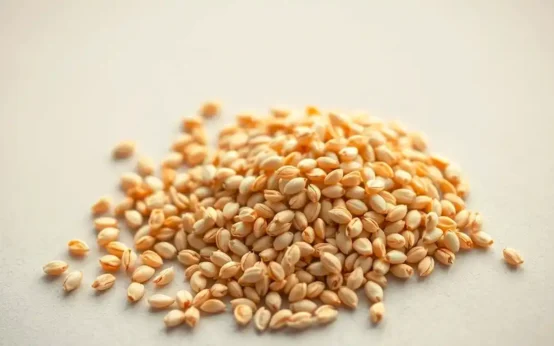Ever felt your nerves spike before a big meeting or just out of the blue? You’re not alone in asking, “do certain foods help with anxiety”, especially when daily stress feels hard to manage. Research now shows what you eat can impact how you feel, sometimes more than you might expect.
This article looks at the science behind food and anxiety. You’ll find out which foods could make a difference, why nutrients matter for mental health, and how your everyday meals can play a role in calming stress. Curious about real, practical steps? We’ll also cover simple actions you can take at home and explain how healthy fats and mood connection might be a key part of the answer.
Understanding Anxiety and Its Connection to Diet
Anxiety is not just a fleeting worry that comes and goes. For many, it’s a daily companion that can make even the simplest tasks feel overwhelming. Around the world, anxiety affects millions of people of all ages. It’s common, but that doesn’t make it any less serious or easy to handle. While therapy, lifestyle habits, and support networks often take center stage, diet is gaining attention as a powerful tool we can influence.
What Is Anxiety? Why Does It Matter?
Anxiety is your body’s built-in alarm system. It signals danger or stress, making your heart race and your palms sweat. This response is part of being human, meant to help us deal with challenges. But sometimes, that alarm keeps ringing long after the threat has passed. That’s when anxiety can turn from helpful to harmful, affecting sleep, focus, and even relationships.
Researchers now see anxiety as a complex mix of genetics, environment, and health habits. It’s not just what happens in your mind—what you put in your body could make a difference too.
The Prevalence of Anxiety and Growing Interest in Diet
You probably know someone living with anxiety or you may have dealt with it yourself. According to leading health groups, anxiety disorders are among the most common mental health struggles worldwide. Because these symptoms touch so many lives, experts are always looking for practical ways to help outside the doctor’s office.
Why has diet become such a hot topic? Studies now suggest that what you eat can shape your emotions and stress response. That means your next meal could nudge you closer to calm or send your nerves into overdrive. It also explains why so many people ask, “do certain foods help with anxiety?” The answer may be more significant than we once thought.
How the Brain and Gut Speak to Each Other
If you’ve ever had a “gut feeling,” you already know a bit about the brain-gut connection. Science calls this the gut-brain axis—a communication network linking your digestive system and your mind. It’s like a secret conversation running all day long. Good bacteria living in your gut can influence mood, stress levels, and even the odds of feeling anxious.
Food doesn’t just fuel your body; it feeds the millions of microbes living in your digestive tract. A diet rich in fiber, healthy fats, and nutrients can support these microbes, which may, in turn, support your mental health. On the flip side, too much processed food can throw things off balance, possibly making anxiety symptoms worse.
Food as a Key Player in Managing Anxiety
Many people stick to classic advice for stress relief—think deep breathing or mindfulness. But more and more, food is being added to that toolbox. Researchers are investigating how meals packed with certain nutrients could calm the mind, while others may amp up anxious feelings.
Diet is not a magic fix. But choosing balanced, nutrient-rich foods might help reduce symptoms. There are even simple ways to start making changes at home. Curious how that works? Find steps and ideas for how to reduce stress and anxiety at home that include food, movement, and sleep tweaks.
Thinking about your meals as a resource for managing anxiety opens up new possibilities. The connection is real, and it starts with what you put on your plate.
Key Nutrients and Foods That May Help with Anxiety
The science around “do certain foods help with anxiety” points strongly to the power of specific nutrients. These nutrients support chemical messengers in your brain, help reduce inflammation, and keep your nervous system running smoothly. It’s not just about one superfood, but rather a team effort from vitamins, minerals, healthy fats, and amino acids working together in your meals.
Let’s look at the standout nutrients that influence anxiety and the foods that fuel your mind.
Magnesium, Antioxidants, and B Vitamins: Their Role in Brain Function and Anxiety
Your brain is an energy powerhouse, needing constant nourishment. Magnesium, antioxidants, and B vitamins are some of the top nutrients involved in keeping your mind steady and helping manage stress.
Magnesium plays a calming role in your nervous system. It helps control neurotransmitters, the messengers your brain uses to send signals. Many people with anxiety have lower magnesium levels. Eating foods rich in magnesium can support a balanced mood.
Antioxidants work like a shield, fighting off stress from free radicals. These unstable molecules can damage brain cells and have been linked to anxiety. Antioxidant-rich foods can offer a protective effect, making you feel more resilient.
B Vitamins (like B6, B12, and folate) are essential for making neurotransmitters that impact mood, such as serotonin and dopamine. A lack of B vitamins has been connected with higher anxiety and low energy.
You can get these nutrients through a variety of wholesome foods like:
- Leafy greens (spinach, Swiss chard, kale)
- Nuts and seeds (pumpkin seeds, almonds, sunflower seeds)
- Whole grains (brown rice, oats, quinoa)
- Legumes (beans, lentils, chickpeas)
Quinoa, for example, is an easy-to-add whole grain that stands out for its magnesium, B vitamins, and antioxidant content. You can explore more about the health benefits of quinoa and see how it fits into a nutrient-rich diet for both body and mind.
Omega-3 Fatty Acids and Amino Acids: The Brain’s Chemical Balance
Omega-3 fatty acids and amino acids play a unique part in brain chemistry. These nutrients affect how your brain makes, releases, and uses neurotransmitters that influence your emotions and handle stress.
Omega-3 fatty acids are best known for their anti-inflammatory properties. They help build and protect nerve cell membranes in your brain. Studies show that people who eat more omega-3s tend to have fewer symptoms of anxiety and depression. They may help lower chronic inflammation, a known trigger for mood changes.
Amino acids are building blocks for proteins and also serve as precursors for neurotransmitters. For instance, tryptophan is an amino acid your body uses to make serotonin, sometimes called the “feel good” brain chemical. Getting enough amino acids can help keep this process running.
The following foods are rich in omega-3s and quality amino acids:
- Oily fish (salmon, sardines, mackerel)
- Flaxseeds and chia seeds
- Walnuts
- Eggs
- Lean meats and legumes
Healthy fats found in these foods don’t just feed your brain, they help you regulate emotions and stress response. Want to dig deeper? You can read about the impact of healthy fats on emotions, which explains how getting enough good fats can support better mood and resilience.
Overall, focusing your diet on foods filled with magnesium, antioxidants, B vitamins, omega-3s, and amino acids is a smart way to support your mind. Each nutrient brings unique benefits, and together they form a strong foundation for managing anxiety from the inside out.
Dietary Habits and Patterns That Influence Anxiety Levels
Diet doesn’t just affect your waistline—it shapes how your brain and body handle stress. The types of foods you eat each day can dial your anxiety up or down over time. When you ask, “do certain foods help with anxiety,” it makes sense to think bigger than just individual foods. Consistent eating patterns—like following a Mediterranean plan or focusing on plant-based meals—have real power to support your mental well-being.
Let’s break down how some common dietary patterns connect with mood, and why steering clear of processed foods matters just as much as filling your plate with fresh ones.
The Mediterranean Diet: An Eating Pattern That Supports Calm
The Mediterranean diet is more than a trend. It features lots of vegetables, fruits, nuts, legumes, whole grains, fish, and healthy fats such as olive oil. People who follow this way of eating often see not just a healthier heart, but better moods and sharper thinking.
What’s special about this pattern? The Mediterranean diet brings steady nutrients that support stable blood sugar and strong gut health, two key players in anxiety management. It turns out, the fiber, antioxidants, and omega-3s you get from these foods help build a resilient brain. Research consistently finds that diets rich in whole, fresh foods link to lower rates of anxiety and depression, compared to diets high in sugar and processed snacks.
Plant-Based Eating and Mental Health
More people are choosing plant-based eating, not just for the planet or their bodies, but for mental clarity and emotional well-being. The focus is on fruits, vegetables, nuts, seeds, whole grains, and legumes. This way of eating skips most animal products and leans into meals that reduce inflammation and boost gut flora.
A balanced plant-based diet offers benefits like more vitamins, minerals, and fiber, the building blocks your brain and nerves need to stay steady. By crowding your plate with plant foods and dialing down on saturated fats and additives, you set a baseline for better mood and less volatility.
If you want to see how a plant-based focus can help with anxiety, have a look at the top 7 benefits of a plant-based diet for mind and body. You’ll find details on why this diet can mean a calmer mind alongside a healthier body.
Avoiding Processed Foods: Protect Your Brain from Mood Swings
Processed foods are everywhere—convenient, cheap, and often loaded with additives, sugar, and salt. But when these make up most of your meals, they can push anxiety levels higher. Diets stacked with refined grains, sugary drinks, and packaged snacks often lead to spikes and crashes in blood sugar, which can rattle your mood and even your sleep.
Research points out that people who eat more processed and ultra-processed foods tend to report more anxiety, fatigue, and low energy. This is partly because processed products lack important nutrients that foster good brain health and gut diversity. The artificial ingredients, colors, and preservatives in these foods can disturb the way your body manages stress and handles emotions.
If you want more on how cutting back on processed snacks could help your mood, check out the effects of processed foods on your body. It breaks down how these products can affect everything from your gut to your brain.
The Value of a Balanced, Whole-Food Diet Over “Miracle” Foods
There’s a lot of talk about “superfoods” or miracle cures. The truth? No single food can keep anxiety away for good. But when you build your meals from whole, minimally processed foods, over time you supply your brain with the nutrients it needs to regulate stress. It’s the pattern that matters most, the big picture of what you eat day in and day out, not just the latest health fad.
A steady, balanced diet loaded with variety protects you against both nutrient gaps and mood dips. Think of your diet as a team effort: vegetables, whole grains, healthy fats, and lean proteins all work together for your best mental state.
Consistent, simple choices add up. Swap that vending machine snack for a handful of nuts. Choose a salad with beans and seeds over a fast-food burger. These changes put you on the path to feeling calmer, clearer, and more in control.
Lifestyle Strategies Beyond Diet for Managing Anxiety
Understanding how certain foods play a role in anxiety sets a strong foundation, but managing anxiety goes well beyond what you put on your plate. For people asking, “do certain foods help with anxiety,” it’s just as important to remember that daily routines, stress habits, how much you move, and your sleep patterns all matter. Your overall lifestyle creates a toolkit that lets you cope and feel better, step by step.
If you want to get the most out of anxiety-reducing foods, make sure you’re supporting your body and mind in other ways too. Blending several self-care strategies can make a bigger impact than diet alone.
Staying Active for a Calmer Mind
Physical movement acts like natural medicine for anxiety. You don’t need to be an athlete or even go to a gym—a brisk walk around your block can do wonders. Physical activity helps:
- Release endorphins, your body’s “feel-good” chemicals
- Burn off nervous energy or tension
- Improve sleep, which lowers anxiety
Try activities you actually enjoy, such as walking, dancing, swimming, or yoga. If you make movement fun or social, you’ll find it much easier to stick with.
Stress Management Techniques: Simple Daily Habits
How you handle everyday stress can shape your anxiety levels just as much as diet.
Here are a few habits worth trying:
- Mindfulness or meditation: These help you stay rooted and steady, not pulled around by racing thoughts.
- Deep breathing: Slow, controlled breaths calm your nervous system and help you regain control.
- Journaling: Writing out worries often helps make anxious thoughts less intense.
Building a few of these habits into your routine can provide a reliable buffer against stress. If you want practical, science-backed techniques, check out these effective stress and anxiety management tips.
Sleep: The Unsung Hero for Mood Stability
Ongoing lack of sleep can make anxiety much worse. When you’re tired, your brain goes into overdrive and it’s harder to keep stress in check. Simple sleep habits to support mental health include:
- Sticking to a consistent bedtime
- Limiting screen time before bed
- Keeping your sleep spaces cool and dark
Good rest boosts resilience and makes diet changes work even better. Think of quality sleep as the “reset button” for your mind.
When to Seek Mental Health Support
Lifestyle can go a long way, but sometimes more help is needed. If anxiety is interfering with daily life or feels overwhelming, reach out to a mental health professional. Therapy, medication, and support groups can make a dramatic difference.
Food and lifestyle changes offer support alongside—but should not fully replace—medical care when needed.
How Lifestyle Choices Work Together
Diet, physical activity, stress management, quality sleep, and mental health support are all tools that shape how you feel each day. Focus on combining these strategies, rather than relying on just one. Remember, asking “do certain foods help with anxiety” is a smart first step. But the biggest power comes when you connect these habits into your daily life.
Building a toolkit that covers both body and mind leads to steadier moods and helps transform anxiety from a daily struggle into something you can manage with confidence.
Conclusion
The science is clear: certain foods and eating patterns can support a calmer, more balanced mind. While this doesn’t mean food is a cure-all, the answer to “do certain foods help with anxiety” is yes—diet can play a supportive role. Choosing wholesome, nutrient-rich meals, avoiding processed foods, and focusing on consistent habits may help ease daily stress and improve your mood.
True relief from anxiety often calls for a full-picture approach. Alongside changes to what you eat, regular movement, sleep, and daily stress care matter just as much. If anxiety gets in the way of daily life, reach out to a healthcare professional for support. Everyone’s needs are a little different, and guidance can make your journey smoother.
Thanks for reading and caring for your own well-being. Every small change matters. If this topic hit home, you might also find value in learning how to stop feeling depressed all the time with practical lifestyle strategies. Remember, you have more tools at your fingertips than you might think.
FAQ:
Can eating certain foods really help with anxiety?
Some foods may help ease mild anxiety for some people, but food alone won’t cure anxiety disorders. Good nutrition supports brain health, while certain foods might have calming effects.
What foods should I eat to help reduce anxiety?
Look for foods rich in magnesium, zinc, and B vitamins. Oats, leafy greens, nuts, whole grains, salmon, and yogurt often make the list. Foods with tryptophan, like turkey and eggs, may support serotonin, which can boost mood.
Do any specific drinks help with anxiety?
Chamomile tea, green tea, and drinks with probiotics may offer some soothing effects. Staying hydrated matters too, as dehydration can make symptoms worse.
Are there foods I should avoid if I have anxiety?
Limit caffeine, high-sugar snacks, and ultra-processed foods. These can raise heart rate or blood sugar swings, which may spark anxiety or panic.
Is chocolate good or bad for anxiety?
Dark chocolate in small amounts may help, thanks to its antioxidants and magnesium. However, too much can add caffeine and sugar, which may make anxiety worse for some people.
Can probiotics help with anxiety?
Some research links gut health and mood. Foods with probiotics, like yogurt and fermented veggies, might help, but the evidence is still growing.
Should I take supplements for anxiety?
Only take supplements with medical advice. Getting nutrients from food is safer. Some supplements, like magnesium or omega-3s, may help but can cause side effects or interact with medications.
How long does it take to notice a difference from changing my diet?
Results vary. Some people may feel better in a few days, while others need weeks. Long-term healthy eating matters most.
Will changing my diet replace other anxiety treatments?
No. Healthy food can support your treatment plan, but it won’t replace therapy or medication if those are recommended by your doctor.
What should I do if food changes don’t help my anxiety?
Talk with your doctor or a mental health professional. Food is just one part of managing anxiety. Professional support is always a strong next step if symptoms stick around.



 Importance of Hydration for Your Brain, Body, and Everyday Energy
Importance of Hydration for Your Brain, Body, and Everyday Energy  Health Benefit of Sesame Seed
Health Benefit of Sesame Seed  Healthiest Breakfast Cereal for Children
Healthiest Breakfast Cereal for Children  Anxiety Management Techniques
Anxiety Management Techniques  Vegan Oil Free Mayonnaise Recipe
Vegan Oil Free Mayonnaise Recipe  What Makes Fat in Our Body?
What Makes Fat in Our Body?